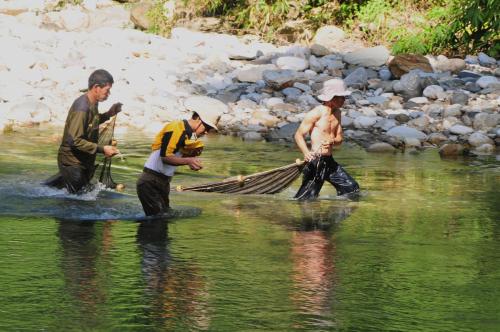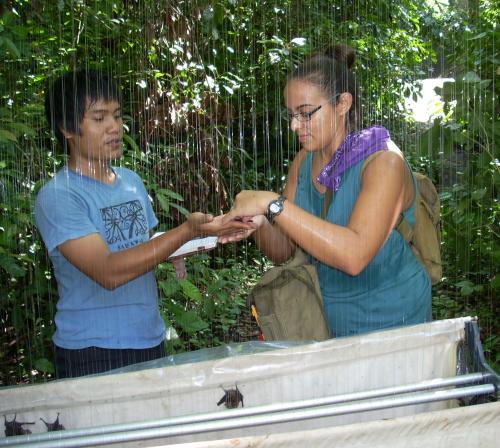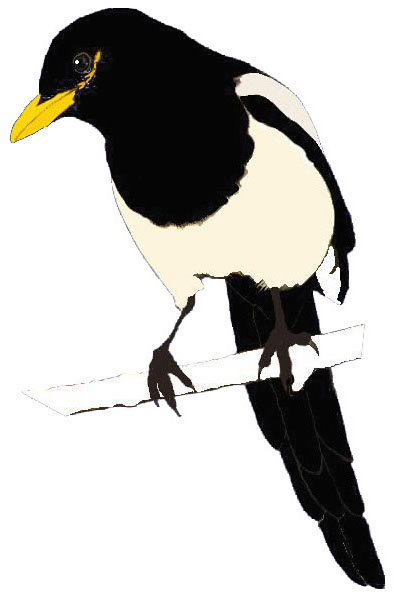Indonesia
Indonesia

Launched in 2008, this multi-national and multi-disciplinary biodiscovery program was established in Sulawesi, Indonesia as one of eight globally funded International Cooperative Biodiversity Groups (ICBG). The ICBG Indonesia project (2008-2013) was funded by the National Institute of Health (NIH), National Science Foundation (NSF) and US Departments of Energy and Agriculture through the Fogarty International Center of the NIH. The ICBG program was developed to address the interdependence of biodiversity exploration for potential applications in health, with investments in research capacity that support sustainable use of these resources, the knowledge to conserve them, and equitable partnership frameworks among research organizations in the U.S. and low- and middle-income-countries. The broader aims of the Indonesia ICBG were to document and conserve the precious biodiversity of a relatively pristine region in the Mekongga Mountains, Sulawesi to discover natural product lead compounds that have the potential to be developed into novel therapeutics, and discover improved biofuels technologies. Scientific infrastructure development and training of undergraduate, graduate, and postgraduates in the US and Indonesia were also major goals of our project. This project strived to meet the highest ethical standards to ensure the rights of Indonesians to derive benefits from their natural resources. A key component has been the development of international cooperation between US and Indonesian scientists. In addition, this project brought together a multidisciplinary team of field biologists (botanists, zoologists and entomologists), microbiologists, and chemists. The Indonesia ICBG was comprised of collaborators that included scientists at UC Davis, the Indonesian Institute of Sciences (LIPI), the Indonesian Ministry of Forestry (FORDA), UC Berkeley, UC Santa Cruz, UC San Francisco, and USDA Forest Service. Learn more about the ICBG here.

Specifically, the MWFB served as the associate program leader for biodiversity sampling and species discovery. We coordinated with our colleagues from the UC Davis Bohart Museum of Entomology, Center for Plant Biodiversity, and the Phaft Yeast Collection, and Indonesian counterparts in LIPI and FORDA to conduct five research expeditions over a four-year period to conduct plant, insect, microbe and vertebrate sampling in the remote and unsurveyed region of the Mekongga Mountains. These rugged mountains had never been adequately surveyed for its biodiversity prior to our efforts. The primary and secondary rainforests yielded important biological samples documenting the unique flora and fauna of these mountains. The specimens and biodiversity findings are still being worked on by several taxonomists and ecologists to better understand the unique biodiversity of the island of Sulawesi. Currently the museum is assembling papers on the faunal surveys and our researchers are involved with new species discovery.
One of the most exciting outcomes of our goals of documenting the biodiversity of the Mekongga was that our data helped towards declaring the Mekongga Mountain Range as a National Park, to preserve this precious biodiversity for those who will come after us.
Publications
Nesi, N., Tsagkogeorga, G., Tsang, S. M., Nicolas, V., Lalis, A., Scanlon, A. T., Riesle-Sbarbaro, S. A., Wiantoro, S., Hitch, A. T., Juste, J., Pinzari, C. A., Bonaccorso, F. J., Todd, C. M., Lim, B. K., Simmons, N. V., Mcgowen, M. R., and Rossiter, S. J. Interrogating Phylogenetic Discordance Resolves Deep Splits in the Rapid Radiation of Old World Fruit Bats (Chiroptera: Pteropodidae). Systematic Biology. 2021: 1-13.
Wiantoro, S., Hitch, A. T., Engilis, I. E., Gunawan, H., and Engilis, Jr., A. Bats (Chiroptera) recorded in the lowland of Southeast Sulawesi, Indonesia with notes on taxonomic status and significant range extensions. De Gruyter Mammalia. 2017; Vol. 81, No. 4.
Riyanto, A., Kurniati, H., and Engilis, Jr., A. A new Bent-toed gecko (Squamata: Gekkonidae) from the Mekongga Mountains, South East Sulawesi, Indonesia. Zootaxa. 2016; Vol. 4109, No. 1: 59-72.
Dewi, K. and Hasegawa, H. Two new species of Syphacia (Nematoda: Oxyuridae) in endemic murid rodents from Sulawesi, Indonesia. Journal of Helmnithology. 2014; Vol. 88, Issue 1: 41-49.
Hylebrouck, J., Kurnia Hadiaty, R., and Herder, F. Two new species of viviparous halfbeaks (Atherinomorpha: Beloniformes: Zenarchopteridae) endemic to Sulawesi Tenggara, Indonesia. Raffles Bulletin of Zoology. 2014; Vol. 62: 200-209.
Trochet, J. A., Irham, M., Hitch, A. T., Haryoko, T., Ashari, H., Dwi Putra, D., and Engilis, Jr., A. Range expansion of Lemon-bellied White-eye Zosterops chloris and Sooty- headed Bulbul Pycnonotus aurigaster to south-east Sulawesi, Indonesia. Forktail. 2014; No. 30: 143-145.
